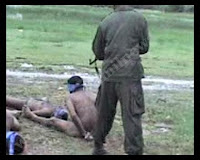
The Kachin have long been persecuted by Burma’s military junta, in all its various forms, and the new faux-civilian setup is no exception. Before last years rigged election, Senior General Than Shwe and his cronies attempted to incorporate all ethnic rebel groups on ceasefire into a junta-led border guard force. This was predictably refuted by the Kachin Independence Army (KIA) – which exists to defend its people from the looting, rape and ethnic cleansing that minority groups face in Burma. In response the junta’s troops broke their fourteen year ceasefire with the KIA, launching a brutal and bloody onslaught in early June. Since then the crimes against humanity for which the junta is infamous, has been relentless. Gang rape is a weapon, civilians are targets and entire villages are levelled in a vicious attempt to exterminate the brave rebels.
With between ten and fifty thousand fighters the KIA is a force to be reckoned with; and whilst defensive it poses a genuine threat to the junta’s control in Northern Burma, especially should links with other ethnic rebel groups continue to strengthen. However, it also faces an enormous challenge – hence the Kachin presence outside the venues where Mr. Wen courted the British political elite: for once again the Chinese government is actively supporting the Burm
The logic behind this is both economic and political. Firstly China has vast investments just across the Burmese border- where the KIA rebels operate. Hydro-dams and mines provide significant supplies of energy, resources and jobs that could be at risk if the Kachin people succeed in forcing the junta from their land. Perhaps even more threatening for Mr. Wen’s government however is the prospect of resistance, freedom and self-determination flourishing next door. Revolutions have a habit of spreading and the Chinese authorities are already paranoid of domestic unrest inspired by the Arab Spring. A successful uprising much closer to home would be too much to bare. The flow of Kachin refugees into across the border is also something that the Chinese government are keen to halt – raising the appeal of a quick resolution to the conflict – even if it involves a bloody crackdown.
This is why Chinese weapons are passed to the junta, why Burma’s biggest neighbour remains silent despite mounting international criticism of the violence and –most ominously- why the disastrous prospect of Burmese troops being allowed to use Chinese soil to launch a Northern attack appears a growing possibility. If the latter comes to pass, the effects would be catastrophic- the KIA would face an almost unbeatable assault from two fronts, one of Burma’s largest rebel groups could fall, the Kachin people could be left to face the junta’s programme of ethnic cleansing and other minority groups would inevitably follow.
Whilst the UK government’s response to protests during Mr. Wen’s visit was predictably weak in light of the £1.4 billion trade agreements –David Cameron did raise issue of human rights, generating a prickly, angry response from his counterpart. However, no specific issue got an airing- not least the Chinese-government-supported onslaught against the Kachin people. It is imperative that governments and members of the public throughout the international community not only condemn China’s role in the situation, but offer full support to the KIA in their selfless endeavour to defend civilians in the face of unimaginable tyranny. A cession of hostilities against ethnic groups and the initiation of tri-partite dialogue involving them, the junta and the official democracy movement is the only way forward. Not Wen Jiabao– nor anyone else, should be allowed to sabotage that.





















